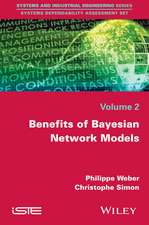Oppositional Concepts in Computational Intelligence: Studies in Computational Intelligence, cartea 155
Editat de Hamid R. Tizhoosh, M. Ventrescaen Limba Engleză Paperback – 28 oct 2010
Din seria Studies in Computational Intelligence
- 20%
 Preț: 449.37 lei
Preț: 449.37 lei - 20%
 Preț: 1158.26 lei
Preț: 1158.26 lei - 20%
 Preț: 986.66 lei
Preț: 986.66 lei - 20%
 Preț: 1452.76 lei
Preț: 1452.76 lei - 20%
 Preț: 168.78 lei
Preț: 168.78 lei - 20%
 Preț: 1291.10 lei
Preț: 1291.10 lei - 18%
 Preț: 1112.30 lei
Preț: 1112.30 lei - 20%
 Preț: 565.39 lei
Preț: 565.39 lei - 20%
 Preț: 649.28 lei
Preț: 649.28 lei - 20%
 Preț: 1047.73 lei
Preț: 1047.73 lei - 20%
 Preț: 1578.96 lei
Preț: 1578.96 lei - 20%
 Preț: 643.50 lei
Preț: 643.50 lei - 20%
 Preț: 657.49 lei
Preț: 657.49 lei - 20%
 Preț: 993.28 lei
Preț: 993.28 lei - 20%
 Preț: 990.80 lei
Preț: 990.80 lei - 20%
 Preț: 989.96 lei
Preț: 989.96 lei - 20%
 Preț: 1165.69 lei
Preț: 1165.69 lei - 20%
 Preț: 1444.52 lei
Preț: 1444.52 lei - 20%
 Preț: 1041.96 lei
Preț: 1041.96 lei - 20%
 Preț: 1047.73 lei
Preț: 1047.73 lei - 20%
 Preț: 1046.06 lei
Preț: 1046.06 lei - 18%
 Preț: 2500.50 lei
Preț: 2500.50 lei - 20%
 Preț: 989.13 lei
Preț: 989.13 lei - 20%
 Preț: 1165.69 lei
Preț: 1165.69 lei - 20%
 Preț: 1164.05 lei
Preț: 1164.05 lei - 20%
 Preț: 1042.79 lei
Preț: 1042.79 lei - 20%
 Preț: 1460.19 lei
Preț: 1460.19 lei - 18%
 Preț: 1403.52 lei
Preț: 1403.52 lei - 18%
 Preț: 1124.92 lei
Preț: 1124.92 lei - 20%
 Preț: 1039.47 lei
Preț: 1039.47 lei - 20%
 Preț: 1008.11 lei
Preț: 1008.11 lei - 20%
 Preț: 1045.25 lei
Preț: 1045.25 lei - 20%
 Preț: 1275.42 lei
Preț: 1275.42 lei - 20%
 Preț: 1040.32 lei
Preț: 1040.32 lei - 20%
 Preț: 988.32 lei
Preț: 988.32 lei - 20%
 Preț: 1169.79 lei
Preț: 1169.79 lei - 20%
 Preț: 1162.37 lei
Preț: 1162.37 lei - 20%
 Preț: 1059.26 lei
Preț: 1059.26 lei - 20%
 Preț: 1164.05 lei
Preț: 1164.05 lei - 20%
 Preț: 1166.52 lei
Preț: 1166.52 lei - 20%
 Preț: 1459.38 lei
Preț: 1459.38 lei - 18%
 Preț: 1005.74 lei
Preț: 1005.74 lei - 20%
 Preț: 997.38 lei
Preț: 997.38 lei - 20%
 Preț: 1055.94 lei
Preț: 1055.94 lei - 20%
 Preț: 1284.47 lei
Preț: 1284.47 lei - 20%
 Preț: 994.08 lei
Preț: 994.08 lei - 20%
 Preț: 1048.72 lei
Preț: 1048.72 lei - 20%
 Preț: 1066.02 lei
Preț: 1066.02 lei - 20%
 Preț: 943.78 lei
Preț: 943.78 lei - 20%
 Preț: 1173.10 lei
Preț: 1173.10 lei
Preț: 1109.92 lei
Preț vechi: 1353.57 lei
-18% Nou
Puncte Express: 1665
Preț estimativ în valută:
212.41€ • 230.64$ • 178.42£
212.41€ • 230.64$ • 178.42£
Carte tipărită la comandă
Livrare economică 22 aprilie-06 mai
Preluare comenzi: 021 569.72.76
Specificații
ISBN-13: 9783642089787
ISBN-10: 364208978X
Pagini: 340
Ilustrații: XII, 328 p. 72 illus.
Dimensiuni: 155 x 235 x 18 mm
Greutate: 0.48 kg
Ediția:Softcover reprint of hardcover 1st ed. 2008
Editura: Springer Berlin, Heidelberg
Colecția Springer
Seria Studies in Computational Intelligence
Locul publicării:Berlin, Heidelberg, Germany
ISBN-10: 364208978X
Pagini: 340
Ilustrații: XII, 328 p. 72 illus.
Dimensiuni: 155 x 235 x 18 mm
Greutate: 0.48 kg
Ediția:Softcover reprint of hardcover 1st ed. 2008
Editura: Springer Berlin, Heidelberg
Colecția Springer
Seria Studies in Computational Intelligence
Locul publicării:Berlin, Heidelberg, Germany
Public țintă
ResearchCuprins
I: Motivations and Theory.- Opposition-Based Computing.- Antithetic and Negatively Associated Random Variables and Function Maximization.- Opposition and Circularity.- II: Search and Reasoning.- Collaborative vs. Conflicting Learning, Evolution and Argumentation.- Proof-Number Search and Its Variants.- III: Optimization.- Improving the Exploration Ability of Ant-Based Algorithms.- Differential Evolution Via Exploiting Opposite Populations.- Evolving Opposition-Based Pareto Solutions: Multiobjective Optimization Using Competitive Coevolution.- IV: Learning.- Bayesian Ying-Yang Harmony Learning for Local Factor Analysis: A Comparative Investigation.- The Concept of Opposition and Its Use in Q-Learning and Q(?) Techniques.- Two Frameworks for Improving Gradient-Based Learning Algorithms.- V: Real World Applications.- Opposite Actions in Reinforced Image Segmentation.- Opposition Mining in Reservoir Management.
Textul de pe ultima copertă
This volume is motivated in part by the observation that opposites permeate everything around us, in some form or another. Its study has attracted the attention of countless minds for at least 2500 years. However, due to the lack of an accepted mathematical formalism for opposition it has not been explicitly studied to any great length in fields outside of philosophy and logic. Despite the fact that we observe opposition everywhere in nature, our minds seem to divide the world into entities and opposite entities; indeed we use opposition everyday. We have become so accustomed to opposition that its existence is accepted, not usually questioned and its importance is constantly overlooked.
On the one hand, this volume is a fist attempt to bring together researchers who are inquiring into the complementary nature of systems and processes and, on the other hand, it provides some elementary components for a framework to establish a formalism for opposition-based computing. From a computational intelligence perspective, many successful opposition-based concepts have been in existence for a long time. It is not the authors intention to recast these existing methods, rather to elucidate that, while diverse, they all share the commonality of opposition - in one form or another, either implicitly or explicitly. Therefore they have attempted to provide rough guidelines to understand what makes concepts "oppositional".
On the one hand, this volume is a fist attempt to bring together researchers who are inquiring into the complementary nature of systems and processes and, on the other hand, it provides some elementary components for a framework to establish a formalism for opposition-based computing. From a computational intelligence perspective, many successful opposition-based concepts have been in existence for a long time. It is not the authors intention to recast these existing methods, rather to elucidate that, while diverse, they all share the commonality of opposition - in one form or another, either implicitly or explicitly. Therefore they have attempted to provide rough guidelines to understand what makes concepts "oppositional".
Caracteristici
Describes and presents opposition-based computing and concepts










